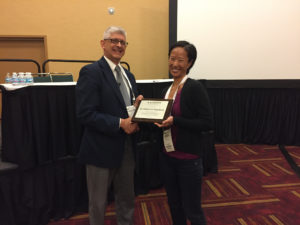SPH professor named Public Health Veterinarian of the Year
August 9, 2017 • Uncategorized

For years, SPH Assistant Professor Katherine Fogelberg, DVM, PhD, has donated her spare time and veterinary services to treat and find homes for rescued pets.
She’s worked with zoo and wildlife animals as far away as South Africa, and has helped connect veterinarians with public health emergency preparedness efforts in the U.S.
She developed an international partnership for SPH students that ties veterinary aid services to human/animal public health and disease prevention.
And most recently, to recognize her contributions in the field, Dr. Fogelberg was named as the 2017 Public Health Veterinarian of the Year by the American Association of Food Safety and Public Health Veterinarians (AAFSPHV).
Trained as a vet with a special interest in zoo medicine, Dr. Fogelberg began exploring the connection of animals to the health of people during her doctoral studies, ultimately leading her to work with Dr. David Sterling to develop a class on this topic for the SPH.
Since then, she has designed and now directs a graduate certificate program in Food Security and Public Health for UNTHSC that studies the food chain implications of animal health on people, and she is helping SPH students see public health in different ways.
“One of Dr. Fogelberg’s achievements since joining UNTHSC has been to connect our public health students with the international organization Veterinarians Without Borders. She led the first group of students to Uganda last year, establishing a link between veterinary aid efforts and protections on the health of people,” said Dr. Dennis Thombs, SPH Dean.
“There are many illnesses and diseases that can be passed from animals to people. So far, our student volunteer teams been able to assist with TB testing and prevention efforts,” he said.
Also important is Dr. Fogelberg’s work with the Society for Disaster Medicine and Public Health, to establish collaborations between emergency first responders, public health professionals and veterinarians.
“Disaster situations like those we saw with hurricanes Katrina and Ike impact animals as much as people,” she said. “Roughly 30 percent of people in a disaster will refuse to evacuate without their pets. Shelters may not be able to accept animals, and it’s devastating for individuals and families who become separated from their pets. It impacts the overall health and well-being of a community.”
“The implications of the human/animal bond are far-reaching. In areas where livestock means livelihood, a disaster could also affect the ability of farms and related businesses to make a living and deliver products,” she said.
As SPH Director of Quality Instruction and Assistant Professor of Biostatistics and Epidemiology, Dr. Fogelberg draws on the different aspects of animal/public health to share a broad perspective with students and inspire their passions the way she found hers.

Social media